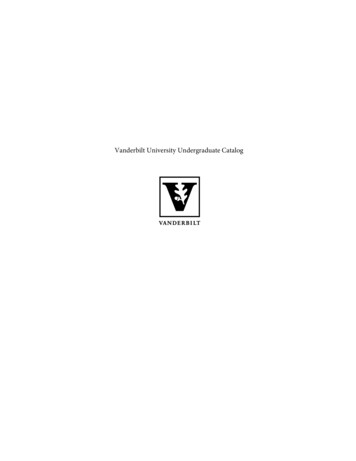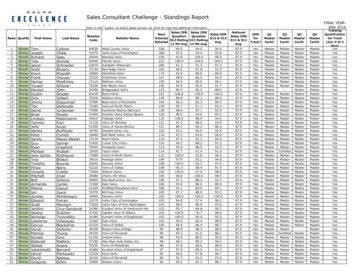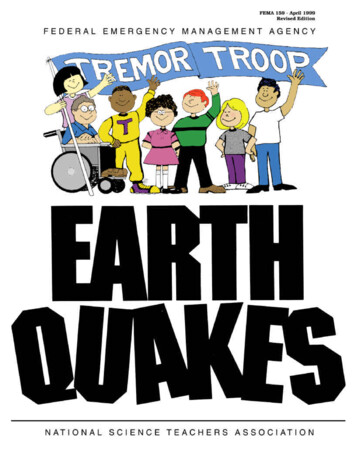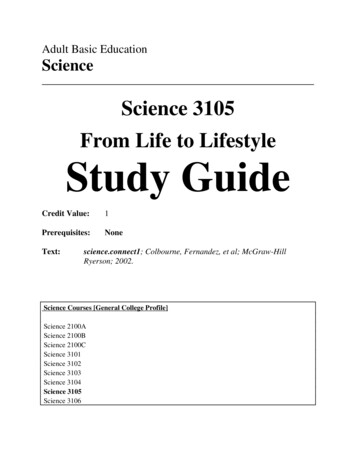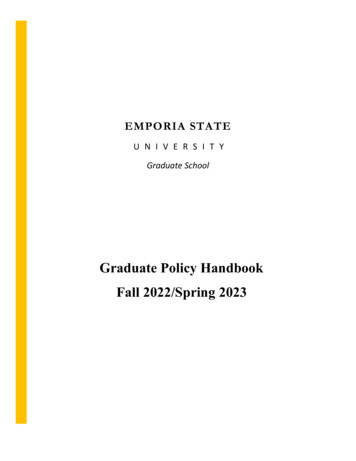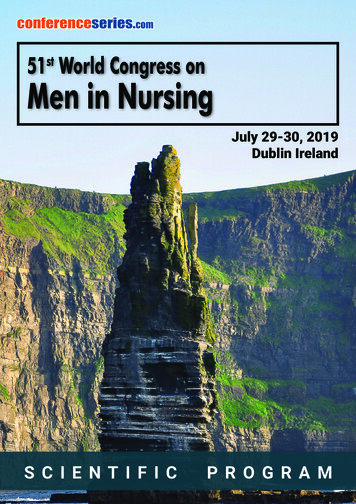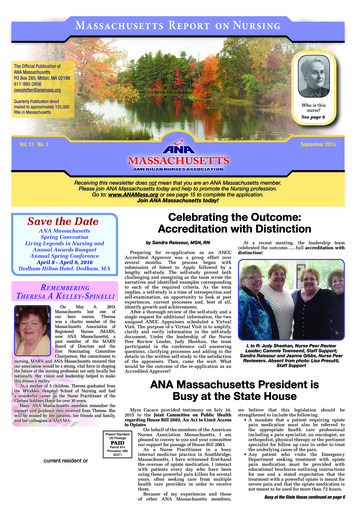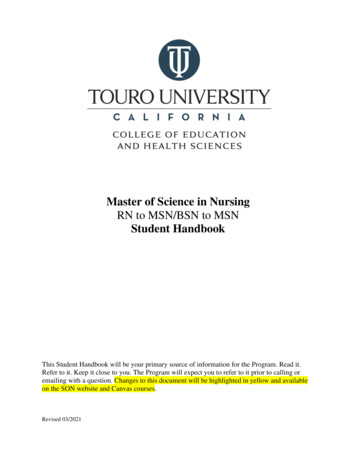
Transcription
Master of Science in NursingRN to MSN/BSN to MSNStudent HandbookThis Student Handbook will be your primary source of information for the Program. Read it.Refer to it. Keep it close to you. The Program will expect you to refer to it prior to calling oremailing with a question. Changes to this document will be highlighted in yellow and availableon the SON website and Canvas courses.Revised 03/2021
Table of ContentsTOURO UNIVERSITY CALIFORNIA . 4INTRODUCTION . 4Non-Discrimination Policy . 4Historical Perspective . 4Mission of Touro College . 5Vision Statement of Touro University California . 5Mission of Touro University California . 5Values of Touro University California . 6Institutional Learning Outcomes . 6Accreditation . 6MASTER OF SCIENCE IN NURSING PROGRAM STUDENT HANDBOOK . 7OVERVIEW . 7MISSION STATEMENT . 7PURPOSE . 7VALUES . 7VISION . 7STUDENT LEARNING OUTCOMES . 7ESSENTIALS AND COMPETENCIES . 8THE NURSE LEADER ROLE . 9COURSE DESCRIPTIONS . 11GRADUATE NURSING STUDENT CLEARANCE REQUIREMENTS. 13Drug and Alcohol Screen . 13Criminal Background Check . 13CPR Certification . 13Personal Health Insurance . 13Health Admission Requirements . 14COVID-19 Policy .14SUPPLIES . 14Medical Supplies. 14Laptop/Tablet Requirements: . 14Technology . 14Software required . 15Books . 15Revised: March 20212
CLINICAL NURSE LEADER CERTIFICATION . 15SCHOOL OF NURING FACULTY/STAFF DIRECTORY. 15PROGRAM SPECIFIC POLICIES & PROCEDURES . 16PURPOSE OF THIS SECTION . 16GOVERNANCE . 17ATTENDANCE. 17ABSENCES . 17LATE WORK . 17HOLIDAYS . 18STUDENT TIME AWAY REQUESTS . 18USE OF WIRELESS DEVICES IN THE CLASSROOM . 18INTERNET SERVICES AND USER-GENERATED CONTENT POLICY, INCLUDINGSOCIAL MEDIA POLICY. 18See Appendix A . 18COMMUNICATION WITH THE PROGRAM AND THE UNIVERSITY . 19RECORDING OF LECTURES . 20GRADING . 20Definition of Grades . 20Grade Appeal . 21ACDEMIC INTEGRITY . 21Student Discipline Procedures . 21ACADEMIC ADVISING . 21GRIEVANCE POLICY . 22LEAVE OF ABSENCE AND WITHDRAWAL . 22BACKGROUND CHECKS/TOXICOLOGY SCREENS . 22CHANGE OF ADDRESS, E-MAIL ADDRESS OR PHONE NUMBER . 22ACADEMIC AND PROFESSIONAL PROGRESS - PROGRAM POLICES ANDPROCEDURES . 23Academic Progress . 23Professional Progress . 23Academic/Professionalism Probation . 23APPEAL PROCESS & PROCEDURE FOR PROGRAM DISMISSAL . 24ACADEMIC FREEDOM . 25APPENDIX A: INTERNET SERVICES AND USER-GENERATED POLICY (Excerpt) 262017 STUDENT HANDBOOK SIGNATURE SHEET . 33Revised: March 20213
TOURO UNIVERSITY CALIFORNIAINTRODUCTIONThe Student Handbook contains policies and requirements that govern academic performanceand student conduct. These policies are unique to Touro University California (TUC), and aredesigned to promote standards for academic competency, professional discipline and personalresponsibility. It represents the parameters of achievement and behavior the faculty expects of itsstudents. It is the responsibility of all students to be knowledgeable about TUC policies. Thesepolicies will be applied to all aspects of the student’s academic progress and personal conduct foras long as the student is enrolled.TUC reserves the right to make changes at any time in this handbook or in the requirements foradmission, graduation, tuition, fees and any rules or regulations. TUC maintains the right torefuse to matriculate a student deemed by the faculty to be academically incompetent orotherwise unfit or unsuited for enrollment.Non-Discrimination PolicyTouro University California does not discriminate on the basis of race, color, national origin,religion, sex (including pregnancy or childbirth), gender identity or expression, marital status,disability, medical condition, genetic information, age, sexual orientation, veteran status, or anyother status characteristic protected by applicable laws in employment, or in admission,treatment or access to educational programs or activities.Historical PerspectiveTouro University is a Jewish-sponsored independent institution of higher and professionaleducation founded by Bernard Lander, PhD, LHD. The institution derives its name from Judahand Isaac Touro, leaders of colonial America who represented the ideal upon which we base ourmission.Touro College was chartered by the State of New York in 1970. The first students enrolled in1971; the class consisted of 35 liberal arts and science students. Since those early days, theinstitution has experienced substantial growth.Touro College has developed into a major institution of higher education, which includes thefollowing schools: The College of Arts and Sciences (1971); the School of Health Sciences(1972); the School of General Studies (1974); the Graduate School of Jewish Studies (1979); theJacob D. Fuchsberg Law Center (1980); the School for Lifelong Education (1989); the NewYork School of Career and Applied Science (1995); the Graduate School of Education andPsychology (1995); Touro University College of Osteopathic Medicine California (founded in1997 as the San Francisco College of Osteopathic Medicine); the Lander College for Men inKew Garden Hills (2001) created through a merger of two previously separate divisions, theSchool of General Studies (founded in 1974) and the School of Career and applied Studies(created in 1995); Touro University Nevada (2004); Touro College South in Florida (2006), andTouro University College of Osteopathic Medicine – New York (2007).Revised: March 20214
Touro opened a branch in Moscow in spring 1991 and its operations now include the Institute ofJewish Studies (branch campus) and a business program with Moscow University Touro (anindependent entity) operated through an inter-institutional agreement. The branch campus inJerusalem comprises the Graduate School of Jewish Studies, an undergraduate business programand the Touro Israel Option (year abroad program). In October 2003, Touro opened a smallbranch campus in Berlin.Touro has long been interested in medical education. In 1983, Touro established the Center forBiomedical Education, a cooperative program leading to an M.D. from the Technion-IsraelInstitute of Technology, Israel's premier school of applied sciences. Success in this and otherrelated programs led Touro to explore the possibility of establishing a college of osteopathicmedicine. Touro sought incorporation in the State of California, and in 1997 located a campus inthe San Francisco Bay Area. The campus was moved to Mare Island in Vallejo, California in1999. In 2003, Touro University College of Osteopathic Medicine (TUCOM) became theFounding College of Touro University California. Touro University California is now composedof three colleges: College of Osteopathic Medicine (grants the Doctor of Osteopathic MedicineDegree – D.O. and the Master of Science in Medical Health Sciences); the College of Educationand Health Sciences (grants Master’s degrees in education and provides teacher credentials; theMaster of Science in Physician Assistant Studies-MSPAS and Master of Public Health); theMaster of Science in Nursing; and the College of Pharmacy (grants the Doctor of Pharmacy).As Touro College looked to other potential sites for a college of osteopathic medicine, Nevadawas chosen as a potential site due to the current physician shortage in Nevada and the rapidlygrowing population within Las Vegas and the surrounding communities. The branch campus,Touro University College of Osteopathic Medicine - Nevada, matriculated its first class in fall2004 and provided programs in osteopathic medicine and physician assistant studies. TouroUniversity – Nevada now consists of the College of Osteopathic Medicine and the College ofHealth and Human Services providing programs in nursing, occupational therapy, physicaltherapy and education.Mission of Touro CollegeTouro College is an independent institution of higher and professional education under Jewishauspices, established to transmit and perpetuate the Jewish heritage and to serve the generalcommunity in keeping with the historic Judaic commitment to intellectual inquiry, thetransmission of knowledge, social justice, and to serve society.Vision Statement of Touro University CaliforniaInspirational teaching and scholarship, transformative leadership, and exemplary service.Mission of Touro University CaliforniaTo provide graduate and professional educational excellence in the fields of Health Sciences,Public Health, and Education. The TUC learning experience is student-centered, enriched byfocused research and scholarship, and prepares professionals for rewarding lives in service toothers both locally and around the globe.Revised: March 20215
Values of Touro University California Respect for the inherent value and dignity of each individual Intellectual inquiry, discovery, and passion for life-long learning Acceptance and appreciation of diversity Compassion and service to society Student-centered education Collaboration and sense of community Promotion of interprofessionalismInstitutional Learning OutcomesTo exemplify Judaic values of social justice, intellectual pursuit and service to humanity, TouroUniversity students will demonstrate the ability to:1. Think critically to make evidence-informed decisions and evaluate conclusions in areal-world context2. Act in a professional and ethical manner3. Use knowledge, skills and effective communication to benefit diverse communities4. Collaborate across disciplines toward a common goalAccreditationTouro University California (TUC), and its branch campus in Henderson, Nevada (TUN), arefully accredited by the Western Association of Schools and Colleges (WASC). The WASCCommission reaffirmed Institutional Accreditation on July 20, 2018 after a three stage reviewwhich demonstrated core commitments to Institutional Capacity and EducationalEffectiveness. The next accreditation review is scheduled for Spring 2026. The master’s degree program at Touro University California is accredited by the Commission onCollegiate Nursing Education (http://www.ccneaccreditation.org). The Doctor of Nursing Practice program at Touro University California is accredited by theCommission on Collegiate Nursing Education (http://www.ccneaccreditation.org).Revised: March 20216
MASTER OF SCIENCE IN NURSING PROGRAM OVERVIEWThe ADN to MSN and BSN to MSN Program(s) prepare nurses for the nurse leader role inquality and safety in health care improvement. The TUC School of Nursing MSN program doesnot prepare students to become Clinical Nurse Leaders (CNL). The CNL competencies areemployed throughout the MSN curriculum to develop the nurse leader (NL) role in quality andsafety improvement in the clinical setting. While not explicitly preparing students for the CNLexam, students may choose to sit for the national examination for the CNL at the completion ofthe program.The program is designed for practicing nurses and is delivered in a hybrid format, blendingonline, face to face teaching, and non-traditional course scheduling. Clinical experiences occurin a variety of local health care agencies and provide opportunities for 400 hours ininterdisciplinary nursing practice, leadership and teaching experience. Students satisfactorilycompleting the 18-month course of study (ADN to MSN) and 12-month course of study (BSNto MSN) and who have fulfilled all of the requirements for graduation published in this StudentHandbook will receive a Master of Science in Nursing (MSN). Upon successful completion ofthe ADN to MSN program, graduates may apply for the Public Health Nursing Certificatethrough the California Board of Registered Nursing and are prepared to pursue doctoral study.MISSION STATEMENT SCHOOL OF NURSINGTo serve the community and larger society through the preparation of professional nurses astransformational leaders to meet the needs of the complex and diverse health care environment.PURPOSETo achieve the mission and to prepare students with Associate, Baccalaureate, and GraduateDegrees for roles as advanced nursing leaders, clinicians, and educators.VALUES Leadership Diversity Professionalism Collaboration Life-long LearningVISIONTo be a leader in progressive nursing education.STUDENT LEARNING OUTCOMESSLO 1: Synthesizes knowledge from nursing and other academic disciplines (bio/psychosocial,computer science, genetics, communication, public health, ethics, and lifespan development) tocontinually improve the delivery of nursing care for diverse populations across complex healthcare environments.SLO 2: Analyzes organizational and systems leadership skill and systems leadership skills topromote high quality and safe health care.SLO 3: Designs, implements, and disseminates a quality/safety improvement project within ahealth care system to improve health care outcomes.SLO 4: Integrates translational research concepts and evidence in increasingly complex andRevised: March 20217
diverse practice settings to improve healthcare outcomesRevised: March 20218
SLO 5: Integrates data from nursing, computer, and communication and information science tocoordinate and improve health care outcomes.SLO 6: Analyzes health care policy and advocates at the systems level through the policydevelopment process to improve health and health care.SLO 7: Implements relationship-centered leadership to build and sustain collaborative, interprofessional teams to coordinate care delivery.SLO 8: Integrates health promotion/risk reduction and population health concepts in the designand delivery of health care.SLO 9: Demonstrates advanced depth and breadth of nursing and related sciences, and integratesthis knowledge into practiceESSENTIALS AND COMPETENCIESConsistent with The Essentials of Master’s Education in Nursing (March 21, 2011) studentswill demonstrate competency in the following areas:Essential I: Background for Practice from Sciences and HumanitiesRecognizes that the master’s-prepared nurse integrates scientific findings from nursing,biopsychosocial fields, genetics, public health, quality improvement, and organizational sciencesfor the continual improvement of nursing care across diverse settings.Essential II: Organizational and Systems LeadershipRecognizes that organizational and systems leadership are critical to the promotion of highquality and safe patient care. Leadership skills are needed that emphasize ethical and criticaldecision making, effective working relationships, and a systems-perspective.Essential III: Quality Improvement and SafetyRecognizes that a master’s-prepared nurse must be articulate in the methods, tools,performance measures, and standards related to quality, as well as prepared to apply qualityprinciples within an organization.Essential IV: Translating and Integrating Scholarship into PracticeRecognizes that the master’s-prepared nurse applies research outcomes within the practicesetting, resolves practice problems, works as a change agent, and disseminates results.Essential V: Informatics and Healthcare TechnologiesRecognizes that the master’s-prepared nurse uses patient-care technologies to deliver andenhance care and uses communication technologies to integrate and coordinate care.Essential VI: Health Policy and AdvocacyRecognizes that the master’s-prepared nurse is able to intervene at the system level through thepolicy development process and to employ advocacy strategies to influence health and healthcare.Essential VII: Interprofessional Collaboration for Improving Patient andPopulation Health OutcomesRecognizes that the master’s-prepared nurse, as a member and leader of interprofessional teams,communicates, collaborates, and consults with other health professionals to manage andcoordinate care.Revised: March 20219
Essential VIII: Clinical Prevention and Population Health for Improving HealthRecognizes that the master’s-prepared nurse applies and integrates broad, organizational, clientcentered, and culturally appropriate concepts in the planning, delivery, management, andevaluation of evidence-based clinical prevention and population care and services to individuals,families, and aggregates/identified populations.Essential IX: Master’s-Level Nursing PracticeRecognizes that nursing practice, at the master’s level, is broadly defined as any form of nursingintervention that influences healthcare outcomes for individuals, populations, or systems.Master’s-level nursing graduates must have an advanced level of understanding of nursing andrelevant sciences as well as the ability to integrate this knowledge into practice. Nursing practiceinterventions include both direct and indirect care components.THE NURSE LEADER ROLE (NL) The Nurse Leader role in quality and safety in health care parallelsthe role of the American Association of Colleges of Nursing (AACN, 2007) Clinical Nurse Leader (CNL)role. The TUC School of Nursing MSN program does not prepare students to become Clinical NurseLeaders (CNL). The CNL competencies are employed throughout the MSN curriculum to develop the nurseleader (NL) role in quality and safety improvement in the clinical setting. While not explicitly preparingstudents for the CNL exam, students may choose to sit for the national examination for CNL certification atthe completion of the program.The following are the broad areas for the role of the CNL (American Association of Colleges of Nursing,2013):Clinician: designer/coordinator/integrator/evaluator of care to individuals, families, groups,communities, and populations; able to understand the rationale for care and competently deliverthis care to an increasingly complex and diverse population in multiple environments. The NLprovides care at the point of care to individuals across the lifespan with particular emphasis onhealth promotion and risk reduction services.Outcomes Manager: synthesize data, information, and knowledge to evaluate and achieveoptimal client outcomes.Client Advocate: adept at ensuring that clients, families, and communities are well-informedand included in care planning and is an informed leader for improving care. The CNL also servesas an advocate for the profession and the interdisciplinary health care team.Educator: uses appropriate principles and strategies as well as current information, materials,and technologies to teach clients, groups, and other health care professionals under theirsupervision.Information Manager: able to use information systems and technology that put knowledge atthe point of care to improve health care outcomes.Systems Analyst/Risk Anticipator: able to participate in systems review to improve qualityof client care delivery and at the individual level to critically evaluate and anticipate risks toclient safety with the aim of preventing medical errors.Team Manager: able to properly delegate and manage the nursing team resources (humanand fiscal) and serve as a leader and partner in the interdisciplinary health care team.Revised: March 202110
Member of a Profession: accountable for the ongoing acquisition of knowledge and skillsto effect change in health care practice and outcomes and in the profession.Lifelong Learner: recognizes the need for and actively pursues new knowledge and skills asone's role and needs of the health care system evolves.Revised: March 202111
MSN COURSE OF STUDYCourse #NRSC 601NRSC 602NRSC 603NRSC604a/bNRSC607a/bNRSC608a/bNRSC 605NRSC 606ADN to MSNFall SemesterTransition to Graduate EducationCommunity Health NursingCommunity Health Nursing clinical (90hours clinical for PHN certification)Session 1 Spring SemesterAdvanced Physical Assessment *Advanced Pharmacology *Advanced Pathophysiology *Session 2 Spring SemesterLeadership in Health CareClinical: Leadership 45 hoursBSN to MSNUnits832333Session 1Advanced Physical Assessment *Advanced Pharmacology *Advanced Pathophysiology *33321Session 2Leadership in Health CareClinical: Leadership 45 hours21Session 3 Summer SemesterNRSC 609NRSC 611NRSC 612NRSC 614Evidence-based Practice &Informatics**Resource Management in HealthCare**Clinical: Care management (45 hours)***Epidemiology/Population Statistics **UnitsSession 32212NRSC 610NRSC 613NRSC615Session 4 Fall SemesterHealth Care Policy & Ethics**Health Promotion/Risk Reduction **Clinical: Education & Outcomes (90hours)***NRSC616NRSC617Session 5 Fall SemesterNurse Leader Role Synthesis ***Nurse Leader Role Immersion (220Hours) ***33Total Units46Evidence-based Practice &Informatics**Resource Management in HealthCare**Clinical: Care Management (45hours)***Epidemiology/Population Statistics **2212322Session 4Health Care Policy & Ethics**Health Promotion/Risk Reduction **Clinical: Education & Outcomes (90hours)***322Session 5Nurse Leader Role Synthesis ***Nurse Leader Role Immersion (220Hours) ***3333Revised: March 202112
COURSE DESCRIPTIONS*ADN to MSN (46 Units)BSN to MSN Course of Study (33 units)*Transition to Graduate Education I (8 units): Introduction to graduate nursing educationbuilds on the foundational degree knowledge and experience. Integrative learning strategiesfocus on the baccalaureate essentials, knowledge, and competencies in the areas of: ethics,evidence-based practice, genetics and genomics, information management, leadership in healthcare, theory, professionalism, and writing in the discipline.*Community Health Nursing (3 units): Explores the role of the community health nursepresented within a public health framework; emphasizing the concept of community as client.Presents nursing interventions related to groups and aggregates identified as high risk for thedevelopment of health problems.*Community Health Nursing Clinical (2 units): Clinical learning experiences provided acrosscommunity-based settings with emphases on community assessment and providing interventionsdesigned to prevent and/or reduce risk of disease and injury and promote health and wellness ofdiverse populations across the lifespan.Advanced Physical Assessment (3 units): Focuses on health and wellness and associatedanatomical dimensions, including health within the context of disability; assessment criteria andtechniques are examined and developed.Advanced Pharmacology (3 units): Conceptual and systematic study of pharmacodynamics,pharmacokinetics, pharmacoeconomics and therapeutic implications for healthcare practitioners.Advanced Pathophysiology (3 units): Explores the cellular mechanisms by which diseaseoccurs, the body's response to the disease process, and the effects of the disease processand genetics on normal function.Leadership in Health Care Systems (2 units): Explores the CLINICAL LEADER role increating and sustaining cultures of quality and safety in complex health care delivery systems;utilizing theories of change and intra and inter-professional communication and teamwork.Evidence Based Practice & Informatics (2 units): Explores nursing research and informationmanagement as the foundation for clinical and organizational decision making and theimprovement of outcomes in health care.Epidemiology/Population Statistics (2 units): Overview of population-based public andinstitutional health including epidemiological concepts and applications, descriptiveepidemiology, and measurements of morbidity and mortality.Revised: March 202113
Health Care Policy and Ethics (3 units): Examines issues of health policy, financing, andthe organization and delivery of health services at the local, national, and global levels.Health Promotion, Risk Reduction, and Disease Prevention and Management (3 units):Examines advanced health promotion, disease reduction, prevention, and management with afocus on risk assessment, health literacy, and health education to improve care outcomes.Resource Management in Health Care (3 units): Overview of health care finance andmanagement of human, financial and community resources to ensure quality, cost-effectiveand optimal outcomes of nursing care.Nurse Leader Role Synthesis (3) Integrates principles of graduate education, Nurse Leader roledevel
RN to MSN/BSN to MSN Student Handbook This Student Handbook will be your primary source of information for the Program. Read it. Refer to it. Keep it close to you. The Program will expect you to refer to it prior to calling or emailing with a question. Changes to this document will be highlighted in yellow and available
